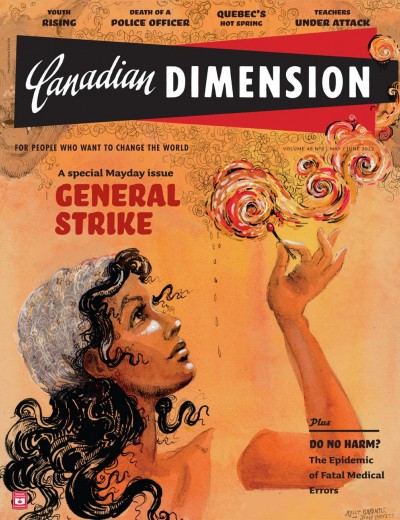Volume 63, Issue 3: May/June 2012

This is our traditional May Day issue, an issue devoted to the struggles and campaigns of working people in Canada and around the world. “This winter offensive by employers is a continuation of the same attacks that workers have faced since the meltdown of the global financial markets in 2008,” argues Mick Sweetman in his overview article, “Labour Struggles in the New Age of Austerity.” A continuation, yes, but also an acceleration. In a fiercely competitive globalized economy, employers are taking advantage of every opportunity to cut their costs. The easiest ones to cut are labour costs — slashing wages and benefits, closing down plants entirely and moving to lower-cost locations. Meanwhile, caught up in a new wave of deficit mania, governments are privatizing where they can, cutting public services, freezing wages and rolling back benefits. This is a very precarious time for the labour movement.
As Sweetman points out, the Occupy movement is challenging unions to stop pleading for government action and to take direct action including civil disobedience. “We think we need to take back our factories, we need to take back our schools, we need to take back our political institutions,” he quotes an organizer of the London Ontario Occupy movement when Electro-Motive Diesel locked out its workers.
But the union did not occupy the factory, and Caterpillar, the company’s owner, closed it down and moved the operation to union-free Indiana.
Some unions are actively discussing how to stem their decline towards the oblivion already experienced in the US. Geoff Bickerton analyses one such effort, the proposed merger of the Canadian Auto Workers and the Canadian Energy and Paper Workers Union. But restructuring may be less important than repoliticization of the labour movement, a process that has yet to begin.
To round out the Labour Focus, Angela Day and Dave Bush cover “The Labour War on our Eastern Shore”; Herman Rosenfeld’s labour column covers the BC teachers’ strike; Sheldon Bernie describes the plight of migrant labour on the prairies; and retired railway worker Jeffrey Langer compares what it’s like to work on the railway today with 20 years ago.
In “The Death of a Police Officer: Valuing the Life of Human Beings in Capitalism,” Harry Glasbeek explains the difference in attitude when regular workers die on the job and when police officers are killed.
Do No Harm
This July is the 50th anniversary of the bitter dispute over Medicare in Saskatchewan that finally led to its adoption first there, then across the country. Our July/ August issue will be devoted to health care and to the status of Canada’s Medicare system. As a prelude to that issue, we offer this alarming article by William Charney, “Do No Harm?: The Epidemic of Medical Errors in the US and Canada.”
Farewells
The Canadian Left lost two of its most beloved figures these past few months, Madeleine Parent and Bob Davis. Rick Salutin and George Martell sent us their moving eulogies to share with our readers. As well, we acknowledge the recent passing of Québec poet Richard Sommer. Back in the 1960s, Richard was one of the first poets to submit their work to Canadian Dimension. He also engaged in some memorably heated exchanges with Irving Layton in our pages.
Youth Rising
With this issue of Canadian Dimension we begin an exciting new column, Youth Rising. It features an analysis of campus-based student activism across Canada. The co-columnists are three student activists: Brigette dePape, Crystel Hajjar and Natasha Peters. “Tar Sands Showdown at the University of Ottawa” is the topic of their first column.
Student activism has been mounting over the last few years and particularly so over the last few months.
On March 21 and 22, graduate students at Carleton University overwhelmingly voiced their support for the Palestinian people by voting for the university’s pension fund to divest from four companies that are complicit in the occupation of Palestine.
This marks the first time in the world that a referendum question on divestment has passed on a university campus.
The March 22 demonstration in Montréal against the Québec government’s hike in tuition fees may have been the largest in Québec and Canadian history, rivalled in size only by the 2003 protests against the Iraq war. It was held just two days after Québec finance minister Raymond Bachand tabled a budget that completely ignored student demands to drop the fees increase. In this issue of CD we feature an exclusive article on the Québec Student strike by Eric Martin and Simon Tremblay-Pepin.
More than 75% of our operating budget comes to us in the form of donations from our readers. These donations help to pay our bills, and honorariums for some of our writers, photographers and graphic artists. Our supporters are part of everything we do.
Donate Now